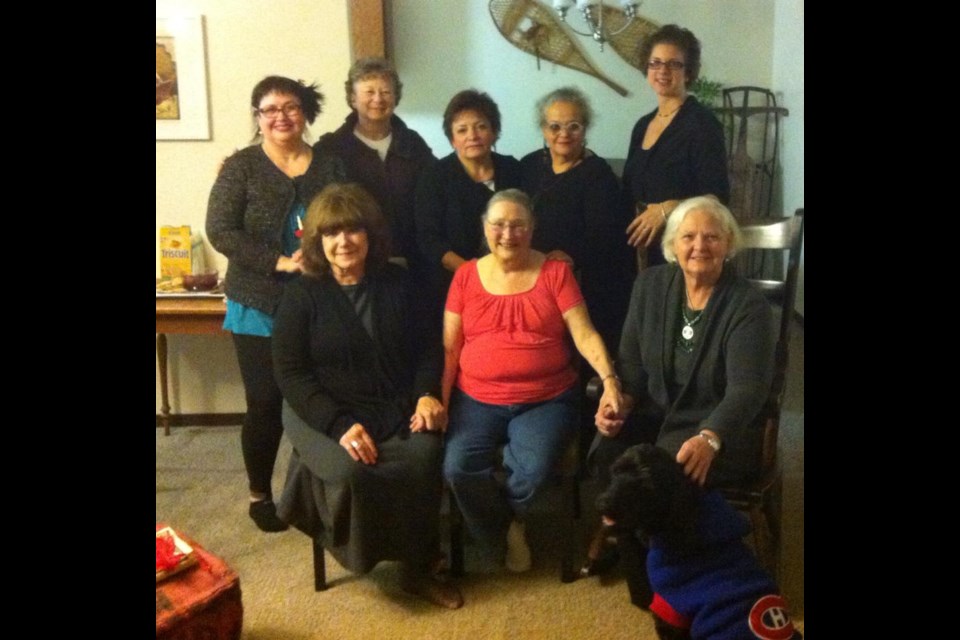The latest book on display at the Craigleith Heritage Depot follows the unique lives of seven generations of Wendat/Wandat women.
“Canada is in a hard place right now. Indigenous people and especially their women, have been dehumanized to the point where erasure and genocide are accepted parts of our Canadian history,” said Dr. Kathryn Labelle, author of the book entitled Daughters of Aataentsic, Life Stories from Seven Generations.
“This book provides seven case studies of Indigenous women that will hopefully help in the re-humanizing process. Every Child Matters and these women help us remember that,” she continued.
Labelle is an associate professor of Indigenous history in North America at the University of Saskatchewan and an honorary member of the Wyandot Nation of Kansas.
In creating the book Labelle worked with the Wendat/Wandate Women’s Advisory Council whose members include: Catherine Tammaro (Wyandot of Anderdon Nation) Judith Kukowski (Wyandot of Anderdon Nation) Chief Janith English (Wyandot Nation of Kansas) Chief Judith Manthe (Wyandot Nation of Kansas) Sallie Cotter Andrews (Wyandotte Nation) Beverlee Pettit (Wyandotte Nation) Linda Sioui (Nation huronne-wendat) and Manon Sioui (Nation huronne-wendat).
Curator of the Craigleith Heritage Depot, Andrea Wilson explains Daughters of Aataentsic, Life Stories from Seven Generations centres on the Wendat/Wyandot/Huron communities “with particular interest in settler colonialism, Indigenous identity and the experiences of women from the seventeenth century to the present.”
The book shares stories of the Wendat people and how generations of activism became intimately tied with notions of family, community, mother work, and legacy.
“The Wendat/Huron were not destroyed when they left Huronia and their history is long and a powerful reminder of the resilience of Indigenous people and especially their women,” said Labelle.
Labelle added that the history outlined in the book is particularly important to the Blue Mountains, the ancestral homeland of the Wendat/Wyandot.
“The people living and visiting the Collingwood-area should know about the ancient history that remains evident today. The Wendat/Wyandot return frequently to visit their ancestors and sacred sites. This history is not removed, but remains deep within the landscape and the modern communities of Simcoe County and surrounding area,” she explained.
The Town of the Blue Mountains is located within the boundary of Treaty 18 region of 1818, which is the traditional land of the Anishnaabek, Haudenosaunee and Wendat-Wyandot-Wyandotte peoples.
“The first generation documented is Cécile Gannendâris, who was born locally and was part of the 1649 dispersal from our region,” explained Wilson. “And that is followed up with six more women who continued her lead to ensure the culture and traditions of the Wyandot/Wendat/Wyandotte communities survived.”
Labelle explained that when conducting research for the book, she aimed her methods at decolonizing the historical discipline by researching with Indigenous people, rather than researching on them.
“My ancestry is connected to Étienne Brûlé, so I come from a long line of settlers both personally (family) and professionally (historians) that have abused and used Wendat people to gain resources and knowledge,” said Labelle.
“My work is one way that we can try to reverse this toxic relationship and create meaningful relationships that benefit both the researcher and the communities they work with,” she explained.
In the creation of the book, Labelle draws from institutional archives and published works, as well as from oral histories and private collections.
She said the final product is a result of collaboration, guided by the Advisory Council who provided “unrelenting support” throughout the process.
“I am incredibly grateful to the Advisory Council for their patience and support. They have been unrelenting in their constant support. That said, I had to earn that trust because there is not a single member who has not witnessed the colonization of their history and been taken advantage of by researchers in the past. That takes time and dedication on both sides,” she said.
Labelle said through her research she learned about the importance of ancestral memory.
“I had never heard of it before. But the intergenerational connections are real and you can see that in this book,” she said.
The Craigleith Heritage Depot will be hosting a virtual book launch for Daughters of Aataentsic, Life Stories from Seven Generations on June 21, National Indigenous People's Day, at 7 p.m. The event will take place over Zoom. Pre-registration is required and can be accessed through the Blue Mountains Library Event Calendar.
“About 85 people can register outside of those involved. You can have a watch party with one registration and your family watching together. We have several signed up that way already,” Wilson said, adding that the museum and library also have a number of related resources that individuals may want to explore before and after the event.
“If people wish to visit our on-line resources they can see the collection of museum materials we have assembled at this time. It is always growing,” Wilson said.
The Blue Mountains Library also has a number of Labelle’s books available for borrowing including this new release, and her award-winning book Dispersed, But Not Destroyed: A History of the Seventeenth Century Wendat People (UBC Press, 2013).
“On our website, we have compiled a book list, one just for Indigenous titles. Here you can find a wide range of materials that will assist you with learning more from DVD’s to fiction to non-fiction, child to adult readers. Meaford and Grey Highlands residents with their community library card can also borrow from the Blue Mountains Public Library,” Wilson added.
